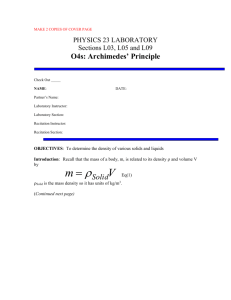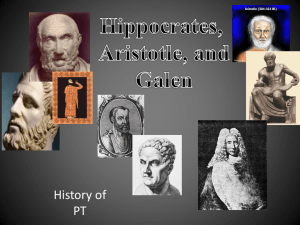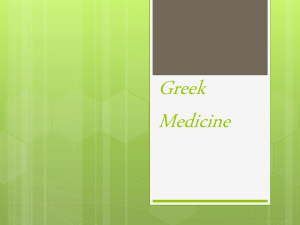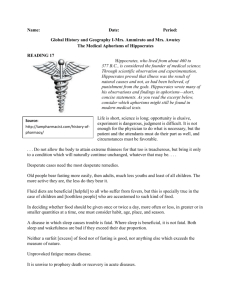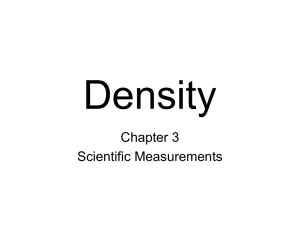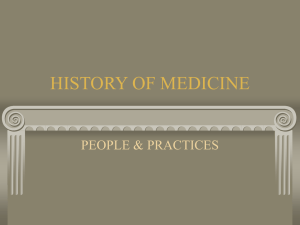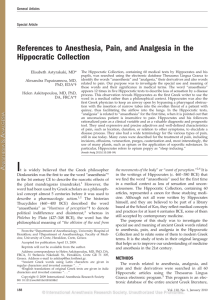Scientific Contributions of Greece
advertisement
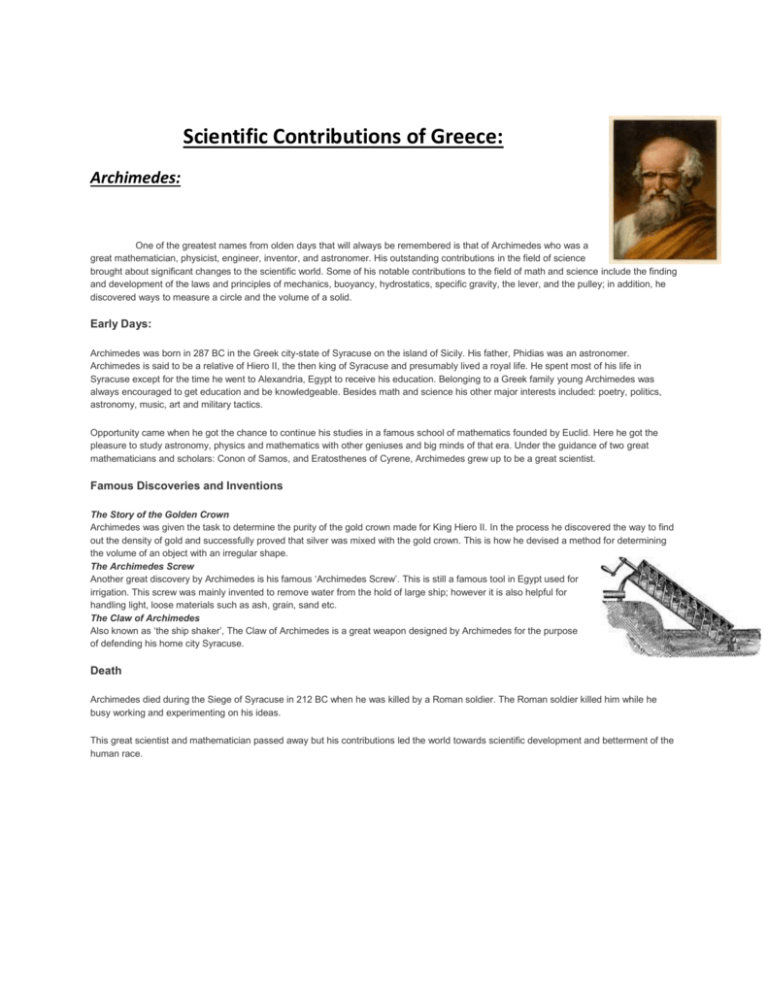
Scientific Contributions of Greece: Archimedes: One of the greatest names from olden days that will always be remembered is that of Archimedes who was a great mathematician, physicist, engineer, inventor, and astronomer. His outstanding contributions in the field of science brought about significant changes to the scientific world. Some of his notable contributions to the field of math and science include the finding and development of the laws and principles of mechanics, buoyancy, hydrostatics, specific gravity, the lever, and the pulley; in addition, he discovered ways to measure a circle and the volume of a solid. Early Days: Archimedes was born in 287 BC in the Greek city-state of Syracuse on the island of Sicily. His father, Phidias was an astronomer. Archimedes is said to be a relative of Hiero II, the then king of Syracuse and presumably lived a royal life. He spent most of his life in Syracuse except for the time he went to Alexandria, Egypt to receive his education. Belonging to a Greek family young Archimedes was always encouraged to get education and be knowledgeable. Besides math and science his other major interests included: poetry, politics, astronomy, music, art and military tactics. Opportunity came when he got the chance to continue his studies in a famous school of mathematics founded by Euclid. Here he got the pleasure to study astronomy, physics and mathematics with other geniuses and big minds of that era. Under the guidance of two great mathematicians and scholars: Conon of Samos, and Eratosthenes of Cyrene, Archimedes grew up to be a great scientist. Famous Discoveries and Inventions The Story of the Golden Crown Archimedes was given the task to determine the purity of the gold crown made for King Hiero II. In the process he discovered the way to find out the density of gold and successfully proved that silver was mixed with the gold crown. This is how he devised a method for determining the volume of an object with an irregular shape. The Archimedes Screw Another great discovery by Archimedes is his famous ‘Archimedes Screw’. This is still a famous tool in Egypt used for irrigation. This screw was mainly invented to remove water from the hold of large ship; however it is also helpful for handling light, loose materials such as ash, grain, sand etc. The Claw of Archimedes Also known as ‘the ship shaker’, The Claw of Archimedes is a great weapon designed by Archimedes for the purpose of defending his home city Syracuse. Death Archimedes died during the Siege of Syracuse in 212 BC when he was killed by a Roman soldier. The Roman soldier killed him while he busy working and experimenting on his ideas. This great scientist and mathematician passed away but his contributions led the world towards scientific development and betterment of the human race. Hippocrates: The ancient Greek physician Hippocrates is called the father of medicine. He changed the course of Greek medicine with his certainty that disease was not caused by gods or spirits but was the result of natural action. Early life Hippocrates was born on the Aegean island of Cos, just off the Ionian coast near Halicarnassus (island of Greece) during the end of the fifth century B.C.E. He is called Hippocrates Asclepiades, "descendant of (the doctor-god) Asclepios," but it is uncertain whether this descent was by family or merely by his becoming attached to the medical profession. Legend likewise places him in the family line of the hero Hercules. Son of Heracleides and Praxithea, Hippocrates's family's wealth permitted him to have a good educational beginning as a child. After nine years of physical education, reading, writing, spelling, music, singing, and poetry, he went to a secondary school, where he spent two years and had very thorough athletic training. It is likely that he went on to study medicine under his father in a form of apprenticeship (arrangement to learn a trade through work experience). This involved following his father and another doctor, Herodicos, from patient to patient and observing their treatment. It is believed that his training included traveling to the Greek mainland and possibly to Egypt and Libya to study medical practices. Adult talents Hippocrates is credited with healing many, including the king of Macedonia whom he examined and helped to recover from tuberculosis (disease of the lungs). His commitment to healing was put to the test when he battled the plague (a bacteria-caused disease that spreads quickly and can cause death) for three years in Athens (430–427 B.C.E. ). It is also clear that the height of his career was during the Peloponnesian War (431–404 B.C.E. ). His teaching was as well-remembered as his healing. A symbol of the many students he encouraged is the "Tree of Hippocrates," which shows students sitting under a tree listening to him. In time he apprenticed his own sons, Thessalus and Draco, in the practice of medicine. The teacher and doctor role combined well in 400 B.C.E. , when he founded a school of medicine in Cos. Hippocratic Corpus The body of writing attributed to Hippocrates, the Hippocratic Corpus, is a collection of roughly seventy works—the oldest surviving complete medical books. In ancient times some works in the Hippocratic Corpus, the first known edition of which are from the time of the emperor Hadrian (reigned C.E. 117–138), were recognized as having been written by persons other than Hippocrates. Modern scholars have no knowledge of his writing style to prove which of the works Hippocrates wrote. Nowhere in the Hippocratic Corpus is the entire Hippocratic set of guidelines found. Each subject was written with a particular reader in mind. Some books are directed toward the physician, some for the pharmacist, some for the professional physician, and some are directed more at the layman (person who is not an expert in the field). In Hippocrates's time doctors wrote treatises (written arguments) for the educated public, who in turn discussed medical problems with their doctors. The aim of these books was to teach the layman how to judge a physician—not to advise on self-treatment or even first aid in order to avoid seeing a doctor. These medical treatises made up the Hippocratic Corpus. Modern readers can see that experimentation played its role in the Hippocratic view of medicine, because the individual approach to disease is nothing more than experimentation. It is obvious, too, that firsthand experience played a part, since throughout the Corpus the plant ingredients of remedies are described by taste and odor. There are also instances of very basic laboratory-type experiments. The Sacred Disease, one treatise of the Hippocratic Corpus, describes dissections (the act of being separated into pieces) of animals, the results of which permitted comparisons to the human body to be drawn. Further, in their attempts to describe the body, the Hippocratics made use of external (outside) observation only. In On Ancient Medicine the internal organs are described as they can be seen or felt externally. It is most unlikely that dissection of the human body was practiced in the fifth century B.C.E. Hippocrates favored the use of diet and exercise as cures but realized that some people, unable to follow such directions, would need medicine. His writings teach that physical handling could cure some physical troubles, like a dislocated hip, by the doctor moving it back into place. In A Short History of Medicine E. A. Ackerknecht summed it up: "For better or worse Hippocrates observed sick people, not diseases." This attitude is a timely solution to those who formerly insisted on the coldly scientific approach of the Hippocratic physician, who seemed to be so callous toward his patient. Little is known of Hippocrates's death other than a range of date possibilities. Different sources give dates of either 374 B.C.E. , the earliest date, or 350 B.C.E. , the latest date. What lives on in modern medicine is his commitment to the treatment of disease.
